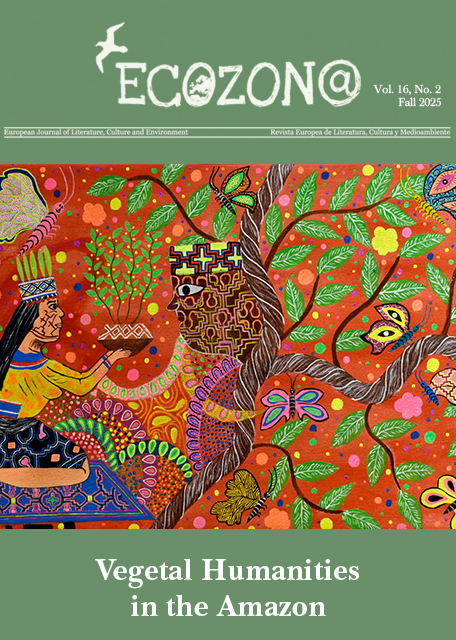<b>"No Forest, No Water. No Forest, No Animals": An Ecocritical Reading of Ekpe Inyang’s <i>The Hill Barbers</i></b> // "Sin bosque, no hay agua. Sin bosque, no hay animales": Una lectura ecocrítica de <i>The Hill Barbers</i> de Ekpe Inyang
DOI:
https://doi.org/10.37536/ECOZONA.2018.9.1.1581Parole chiave:
Ecocriticism, postcolonial studies, postcolonial ecocriticism, Cameroon anglophone literature, literary criticism // Ecocrítica, estudios postcoloniales, ecocrítica postcolonial, literatura anglófona camerunesa, crítica literariaAbstract
This article examines Ekpe Inyang’s play entitled The Hill Barbers (2010) using postcolonial ecocriticism. Combining postcolonial theory and ecocriticism - in order to foreground the author’s postcolonial Cameroonian/African society, the article investigates some of the numerous ecology-related issues raised in the play, among which deforestation, exploitation, capitalism, agency for nature, and the apocalyptic trope. It emerges, from both the play and article, that humans are destroying nature and are consequently suffering from this very destruction. Among the many effects of environmental destruction felt by the Mbungoe human community of the play are acute shortages of drinking water and dwindling animal species on their hills and mountains. One of the major findings of this article is the author’s ability to reconcile hitherto opposing ideologies and practices, such as Judeo-Christianity and African religions and Western science and African traditions, in seeking ways of redressing the increasing ecological problems faced within Cameroonian/African communities and elsewhere around the globe, advocating sustainable behaviour and respect for nature. The paper joins ongoing research attempts to apply ecocriticism in reading literature from postcolonial African societies.
Resumen
Este artículo examina la obra teatral de Ekpe Inyang titulada The Hill Barbers (2010) a través de la perspectiva de la ecocrítica postcolonial. Combinando teoría postcolonial y ecocrítica, el artículo analiza algunas de las numerosas cuestiones relacionadas con la ecología que se plantean en la obra, cuestiones como la deforestación, la explotación, el capitalismo, la preservación de la naturaleza y el tropo apocalíptico. De la obra y del artículo se desprende que los seres humanos están destruyendo la naturaleza y, por consiguiente, sufren los efectos de esta misma destrucción. Entre las muchas consecuencias de la destrucción ambiental sufridas por la comunidad Mbungoe en la pieza teatral están la escasez aguda de agua potable y la disminución de las especies animales en sus colinas y montañas. Uno de los principales hallazgos de este artículo es la capacidad del autor para conciliar ideologías y prácticas hasta entonces opuestas, como el judeocristianismo, las religiones africanas, la ciencia occidental y las tradiciones africanas, apara dar solución a los crecientes problemas ecológicos a los que se enfrentan tanto las comunidades camerunesas/africanas como otras en diversas partes del mundo. De esta manera, se aboga por un comportamiento sostenible y por el respeto hacia la naturaleza. El artículo supone una contribución a los intentos actuales de hacer una lectura de la literatura producida en las sociedades postcoloniales africanas a través del prisma de la ecocrítica.
Downloads
##submission.downloads##
Pubblicato
Fascicolo
Sezione
Licenza
Authors who publish with this journal agree to the following terms:
a) Authors retain copyright and grant the journal right of first publication with the work simultaneously licensed under a Creative Commons Attribution License that allows others to share the work with an acknowledgement of the work's authorship and initial publication in this journal (CC BY-NC for articles and CC BY-NC-ND for creative work, unless author requests otherwise.
b) Authors are able to enter into separate, additional contractual arrangements for the non-exclusive distribution of the journal's published version of the work (e.g., post it to an institutional repository or publish it in a book), with an acknowledgement of its initial publication in this journal.
c) Authors are permitted and encouraged to post their work online (e.g., in institutional repositories or on their website) prior to and during the submission process, as it can lead to productive exchanges, as well as earlier and greater citation of published work (See The Effect of Open Access).










